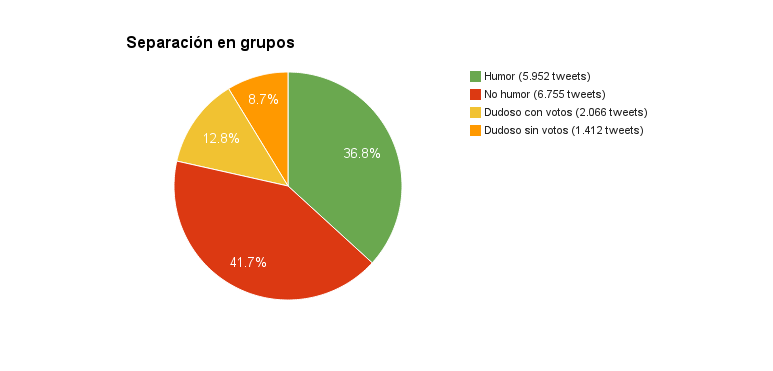This thesis is about deciding if a tweet written in Spanish is humorous or not, applying Supervised Machine Learning. It was carried out by Matías Cubero and Santiago Castro, and supervised by Guillermo Moncecchi and Diego Garat. For detailed information, see the final report.
Looking at this tweet:
— Yesterday, when leaving work I ran over a unicorn.
— No way, you got job?
which is the translated version of this one:
— Ayer, al salir del trabajo atropellé a un unicornio.
— No jodas, ¿tenés trabajo?
Make us think: what makes it funny? What is Humor? What generates laughter? This project tries to approach this. Theory does exist, however none manages to be completely accurate.
16,488 tweets where fetches from humorous accounts and 22,875 from non-humorous (news, philosophical phrases and interesting facts). A web app and an Android app were made so people could give their opinion about which ones are really humorous. 33,531 votes were received from early September to the end of October 2014 (thanks!). It turned out to be little humor in humorous accounts:
This classifier was built based on features that search for informality, certain kind of format, topics that cause psychological tension, among others. It uses techniques such as SVM, kNN, Decision Trees and Naïve Bayes. It achieves a precision of 83.6% and a recall of 68.9% over the created corpus.
A demo was also developed to show the obtained results.
We want to thank Diego Serra and Ignacio Acuña, who carried out their High Performance Computing course project about this job, supervised by Sergio Nesmachnow, with the aim of improving the performance of the algorithms when computing the features values. It can be seen in the hpc-entrega tag. The continuation of their line of work is in the hpc branch.
The main dependencies are:
- Python 2.7 (and some libraries; please see the code)
- MySQL
- Freeling (SVN revision number 2588)
corpus.sql and chistesdotcom.sql dumps must be loaded.
In the file clasificador/config/environment.py write the Twitter API credentials and the database related information. An example of this files is the following:
# coding=utf-8
from __future__ import absolute_import, division, print_function, unicode_literals
import os
# Twitter API credentials
os.environ['CONSUMER_KEY'] = '--CONSUMER KEY--'
os.environ['CONSUMER_SECRET'] = '--CONSUMER SECRET--'
os.environ['ACCESS_KEY'] = '--ACCESS KEY--'
os.environ['ACCESS_SECRET'] = '--ACCESS SECRET--'
os.environ['DB_HOST'] = 'localhost'
os.environ['DB_USER'] = 'pghumor'
os.environ['DB_PASS'] = '--PASSWORD--'
os.environ['DB_NAME'] = 'corpus'
os.environ['DB_NAME_CHISTES_DOT_COM'] = 'chistesdotcom'Export and save the env variable of Freeling too:
FREELINGSHARE=/usr/local/share/freeling
echo "export FREELINGSHARE=$FREELINGSHARE" >> ~/.bashrcStart Freeling servers (to compute the features):
./freeling.sh startAnd then execute:
clasificador/main.pyTo stop the Freeling servers:
./freeling.sh stopclasificador/main.py --helpclasificador/main.py --servidorTo test it:
curl --data-urlencode texto="This is a test" localhost:5000/evaluar./tests.shIf you use this work in research, please cite us:
@inproceedings{castro2016joke,
title={Is This a Joke? Detecting Humor in Spanish Tweets},
author={Castro, Santiago and Cubero, Mat{\'\i}as and Garat, Diego and Moncecchi, Guillermo},
booktitle={Ibero-American Conference on Artificial Intelligence},
pages={139--150},
year={2016},
organization={Springer}
}